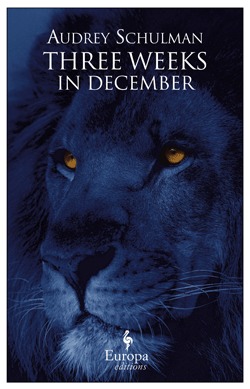Book Review: “Three Weeks in December”
Some fiction can, literally, have the smell of too much research. And so, although I admire the ambition and scope of Audrey Schulman’s new novel, Three Weeks in December, I also feel that she made things harder for herself than she needed to.
Three Weeks in December by Audrey Schulman. Europa Editions, 349 pages, $15.
By Roberta Silman
One of the most beguiling things about fiction is the freedom it gives the writer, even when he/she has chosen to write within a historical context, or a memoir form, or realism with a magical twist. And it is seductive on other levels: the writer can get into skins completely foreign to his own experience.
But there are also dangers: such fiction can, literally, have the smell of too much research. And so, although I admire the ambition and scope of Audrey Schulman’s new novel, Three Weeks in December, I also feel that she made things harder for herself than she needed to. As a result, we have a book too stuffed with background reading, a book sagging with too many characters who, in turn, have far too many dreams. Maybe most important, she has chosen the form of alternating chapters a hundred years apart, a form that is sometimes difficult to follow and ends with an intersection of stories that even I, who have never been good at puzzles, got long before the end.
All this is a pity because there are some very moving passages about the behavior of gorillas, a real understanding of what makes people different, and characters whose pasts are movingly revealed in deft flashbacks that emphasize how remarkable it is that they are able to change and grow in this wild morass of geography that is Africa.
The first thread takes place just at the cusp of the 20th century when a young civil engineer from Maine named Jeremy Turnkey goes to East Africa to oversee the building of the railroad just at the time when two lions in concert ate more than 100 people, according to the Historical Note at the beginning of the book. Jeremy is “different,” very sensitive and probably gay with traits that would have probably identified him as someone on the autism spectrum if such a thing had existed at the end of the 19th century. His determination to leave Maine and go to Africa gives him an opportunity to forge a new life for himself.
There, faced with the harsh realities of such a primitive place, he learns how to cope with his rebellious desires and needs, he learns the meaning of friendship and attains certain strengths he could never have imagined with the help of the African Otombe, his constant companion in what becomes the most pressing issue of his assignment: the killing of the lions. He also ends up engaging in paid sex with an African woman over some period of time, an act which will change the course of his life in mysterious and unknown ways, since they will take place long after the novel ends.
The second story is of a mulatto woman with Asperger’s syndrome named Max Tombay, also from Maine, who is an ethnobotanist given an opportunity to do something more important than the usual assignment from a pharmaceutical company specializing in fragrances: she can go to the jungle in Rwanda to find a vine that might possibly save thousands of people from strokes and heart attacks. What she finds is an outpost run by several women devoted to the gorillas they are studying and determined not to help her because her discovery would lead to the destruction of the gorillas and their way of life.
She begins to understand what is happening when she, too, begins to observe these remarkable animals, making connections between their behavior and her own and developing an affection for them that we have all read about before, in the works of Diane Fossey and Farley Mowat and George Schaller. Moreover, while Max is there, a new danger emerges: a fictional tribe from the nearby Congo named the Kutu led by a man whose followers wear tattered wedding dresses, carry Kalashnikovs and like to eat humans.
The parallels abound, but, in the end, it is Max who runs away with this novel as she begins to see beyond herself in ways she never dreamed. Highly intelligent, but prey to so many tics and aversions (she lives mainly on tofu), she comes across as, almost literally, quite prickly. In one of the early chapters, she thinks:
Science was her respite, the exactness of vocabulary and measurement. Whenever she learned a new term, she could feel the frisson in her mind, the sparkle of connection. All sorts of examples could suddenly be illuminated. “Surface tension” and “crown shyness,” they explained so much about the world, creating clarity where preciously there had just been a profusion of data.
But as she copes with this challenging assignment in Africa, as she reveals her painful past, the death of her father, her mother’s tireless efforts to keep her on target, her own preoccupation with her disability, we get to know her in ways most people cannot know any “Aspie,” and learn to care deeply for this strange young woman. And when she begins to triumph over her inabilities, we become more involved and are rooting for her in ways we could not suspect at the beginning of the book. Here she is, musing at the end, in acute danger,
The flexibility of the neurotypical mind had always amazed her, its lack of loyalty to any currently inconvenient fact, its willingness to convince itself in any sort of blatant untruth simply because the untruth would make life easier.
Her lips were silently mouthing again, “Please God please God please.” Perhaps her work at becoming normal had become a trifle too successful.
So, in the end and despite its flaws, Three Weeks in December has given us Max, who is far from the one-dimensional Aspie she seemed to be, but a fully rounded character who lingers in the mind and, in the end, changes the way we look at the world
Roberta Silman is the author of Blood Relations, a story collection, three novels, Boundaries, The Dream Dredger and Beginning The World Again, and a children’s book, Somebody Else’s Child. She can be reached at rsilman@verizon.net.


